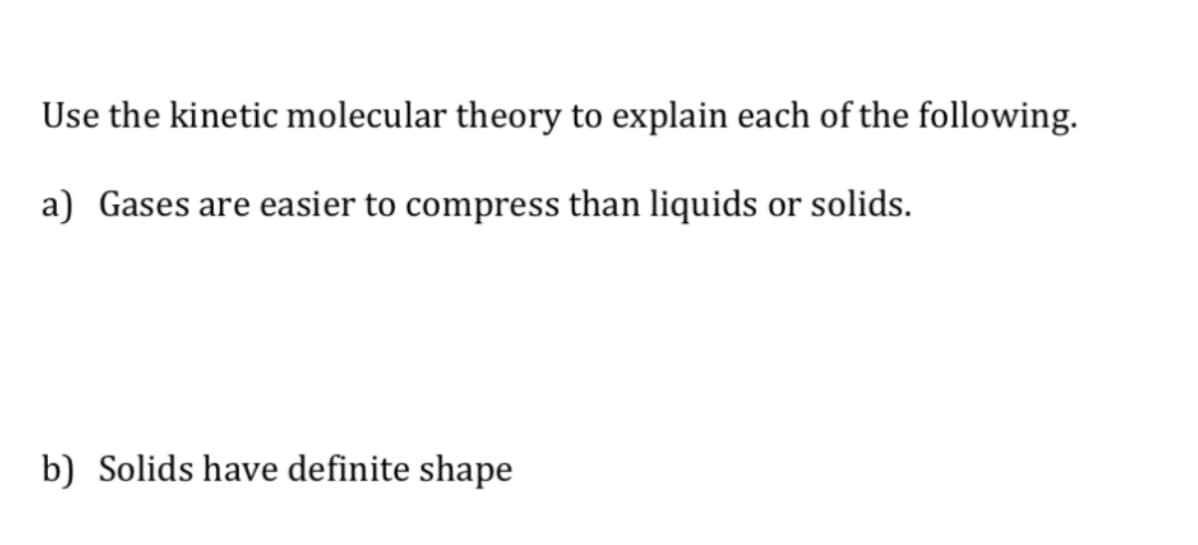Use the kinetic molecular theory to explain each of the following. a) Gases are easier to compress than liquids or solids. b) Solids have definite shape
Use the kinetic molecular theory to explain each of the following. a) Gases are easier to compress than liquids or solids. b) Solids have definite shape
Chemistry: Matter and Change
1st Edition
ISBN:9780078746376
Author:Dinah Zike, Laurel Dingrando, Nicholas Hainen, Cheryl Wistrom
Publisher:Dinah Zike, Laurel Dingrando, Nicholas Hainen, Cheryl Wistrom
Chapter12: States Of Matter
Section: Chapter Questions
Problem 85A
Related questions
Question
Please i want the answe to question below.

Transcribed Image Text:Use the kinetic molecular theory to explain each of the following.
a) Gases are easier to compress than liquids or solids.
b) Solids have definite shape
Expert Solution
Step 1
The Kinetic molecular theory is used to explain the nature of the substances. The gases can be compressed easily than liquids or solids.
Step 2
- a) according to the kinetic molecular theory, in gaseous state the molecules are aligned so far from each other and distance between gas molecules is larger than in solids and liquids so the volume occupied by gas molecules is very less than empty volume, hence gases much more compressible than liquids and solids.
Gases are compressible because most of the volume of gas is composed of the large amount of empty space between the gas particles.
Generally, at room temperature and standard pressure the average distance between gas molecules is about ten times the diameter of the molecules themselves.
But in case of solids and liquids, if we apply pressure, there is essentially no change in volume as there is no space between the individual particles.
Step by step
Solved in 3 steps

Knowledge Booster
Learn more about
Need a deep-dive on the concept behind this application? Look no further. Learn more about this topic, chemistry and related others by exploring similar questions and additional content below.Recommended textbooks for you

Chemistry: Matter and Change
Chemistry
ISBN:
9780078746376
Author:
Dinah Zike, Laurel Dingrando, Nicholas Hainen, Cheryl Wistrom
Publisher:
Glencoe/McGraw-Hill School Pub Co

World of Chemistry, 3rd edition
Chemistry
ISBN:
9781133109655
Author:
Steven S. Zumdahl, Susan L. Zumdahl, Donald J. DeCoste
Publisher:
Brooks / Cole / Cengage Learning

Living By Chemistry: First Edition Textbook
Chemistry
ISBN:
9781559539418
Author:
Angelica Stacy
Publisher:
MAC HIGHER

Chemistry: Matter and Change
Chemistry
ISBN:
9780078746376
Author:
Dinah Zike, Laurel Dingrando, Nicholas Hainen, Cheryl Wistrom
Publisher:
Glencoe/McGraw-Hill School Pub Co

World of Chemistry, 3rd edition
Chemistry
ISBN:
9781133109655
Author:
Steven S. Zumdahl, Susan L. Zumdahl, Donald J. DeCoste
Publisher:
Brooks / Cole / Cengage Learning

Living By Chemistry: First Edition Textbook
Chemistry
ISBN:
9781559539418
Author:
Angelica Stacy
Publisher:
MAC HIGHER

Introductory Chemistry: A Foundation
Chemistry
ISBN:
9781337399425
Author:
Steven S. Zumdahl, Donald J. DeCoste
Publisher:
Cengage Learning

General, Organic, and Biological Chemistry
Chemistry
ISBN:
9781285853918
Author:
H. Stephen Stoker
Publisher:
Cengage Learning
